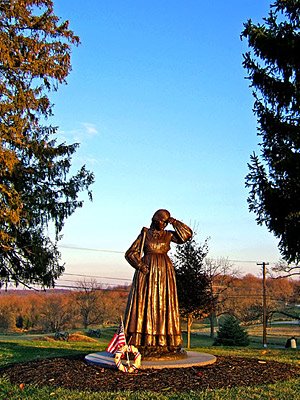One of the unique heroines of the Civil War, Elizabeth Thorn lived in Gettysburg and experienced the horrors of war first hand. Her husband Peter had enlisted one year prior to the battle leaving her as the Evergreen Cemetery's sole caretaker, a position the two had shared until the 1862. Before the Battle of Gettysburg, Elizabeth had averaged about 5 burials a month. Her charge would increase dramatically when the Armies of General Robert E. Lee and General George Gordon Meade collided in the fields around her home. The human wreckage was indescribable. About 10,000 dead lay upon the newly christened battlefield.
 Monument to Elizabeth Thorn in Gettysburg's Evergreen Cemetery,
Monument to Elizabeth Thorn in Gettysburg's Evergreen Cemetery,holding a shovel in her right arm.
Elizabeth would work very hard to put her home back together and to bury a number of the dead. She would later state, "Well, you may know how I felt, my husband in the army, my father an aged man. Yet for all the foul air, we started in. I struck off the graves and while my father finished one, I had another one started." The soon exhausted Elizabeth sought help among her friends. None endured for long however, all leaving for their homes within days due to illness. Elizabeth and her elderly father found themselves alone facing this exhausting work. She said of her predicament, "By that time we had forty graves done. And then father and I had to dig on harder again."
Elizabeth's efforts proved truly remarkable given that, during this time, she was six to seven months pregnant. A short time later, Elizabeth Thorn gave birth to precious little "Rose Meade Thorn", named in part for the commanding general of the victorious Union Army.
Sincerely,
Randy
Please visit my primary site at www.brotherswar.com
All original material Copyright © 2006. All Rights Reserved
Source: Beyond the Gatehouse. Gettysburg's Evergreen Cemetery. Brian A. Kennell, Evergreen Cemetery Association, 2000

